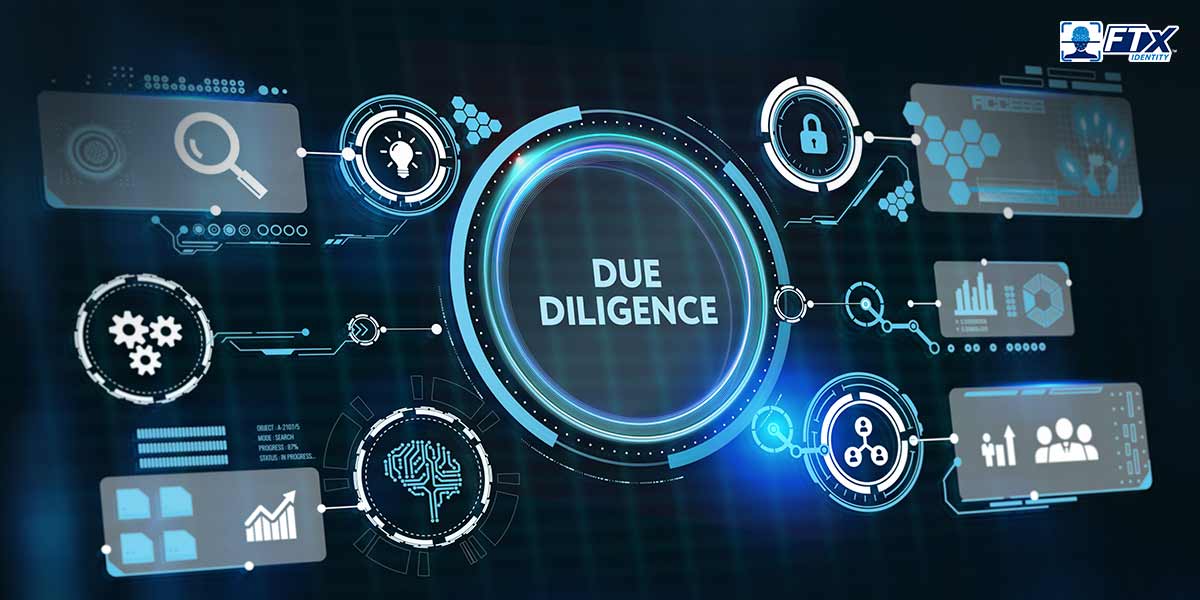Protecting your organization from financial risks and complying with regulatory standards are crucial in today’s dynamic business world.
Enter enhanced due diligence (EDD), a powerful tool for achieving these goals.
Interested in how your business can protect itself? This guide provides a deep dive on EDD, its significance within the Know Your Customer (KYC) framework, and effective approaches to navigating this crucial procedure.

What Is Enhanced Due Diligence (EDD)?
Enhanced due diligence, or EDD, is like doing extra careful checking. It’s used by organizations to look closely at customers and transactions that seem riskier than usual.
While standard due diligence focuses on verifying customer identities and conducting basic risk assessments, EDD goes a step further. It involves a deeper and more thorough examination of various aspects of a customer’s profile, business activities, and financial transactions.
How Does EDD Work?
Enhanced due diligence works by digging deeper into the background and activities of customers. It aims to uncover potential risks that might not be apparent through standard due diligence procedures. EDD typically involves:
- Customer Identification: So, what is the first due diligence requirement? For any due diligence process, including enhanced due diligence, it is the verification of the customer’s identity. This includes verifying personal and business information to ensure you are dealing with the right entity.
- Risk Assessment: EDD goes beyond basic risk assessment. It evaluates various factors like the customer’s financial stability, reputation, and their potential exposure to illicit activities.
- Source of Funds: Understanding the source of funds for financial transactions is crucial. It helps detect money laundering or other illicit activities.
- Ongoing Monitoring: Unlike standard due diligence, EDD is not a one-time process. Continuous monitoring of customer activity is essential to identify any suspicious behavior or changes in risk over time.
- Compliance with Regulations: EDD ensures that the customer or transaction complies with all applicable laws and regulations.
- Documentation: Proper documentation of the EDD process is essential for audit and compliance purposes.

Enhanced Due Diligence and KYC
KYC is a broader framework that includes different steps and methods used by banks and businesses to check who their customers are and understand the risks connected to them.
EDD is an integral part of the KYC framework, especially when dealing with high-risk customers. KYC is not a one-size-fits-all approach, and EDD allows organizations to tailor their due diligence efforts to the specific risks posed by individual customers.
Conducting Due Diligence for Fintech Companies
As the financial industry continues to embrace technological innovation, financial technology (fintech) companies have become prominent players. Conducting due diligence on these entities requires a tailored approach:
- Understanding the Business Model: EDD and identity verification for fintech companies involves understanding their unique business model, including their technology stack, sources of funding, and the types of financial services they provide.
- Assessing Cybersecurity Measures: Given the data-driven nature of fintech, evaluating their cybersecurity measures is crucial. EDD should include an assessment of their data protection and encryption practices.
- Customer Data Handling: How fintech companies handle customer data is of utmost importance. EDD should delve into their data privacy and compliance measures.
- Regulatory Compliance: Make sure the fintech company follows the financial rules and standards in the places where they do business.

Effectively Performing Enhanced Due Diligence
Performing EDD effectively requires a strategic and diligent approach. Here are some best practices to consider:
Prioritize Ongoing Monitoring
EDD is not a one-time task; it’s an ongoing process. Continuous monitoring allows you to stay vigilant for any changes in a customer’s risk profile or suspicious activities. Leveraging technology and automation can enhance the efficiency of ongoing monitoring efforts.
Stay Informed
Regulations and compliance standards can change frequently. Staying informed about the latest developments in the regulatory landscape is crucial. It ensures that your EDD procedures remain up to date and aligned with current requirements.
Invest in Technology
Utilize technology solutions, such as data analytics and artificial intelligence, to streamline the EDD process. These tools can help identify patterns and anomalies that might be missed through manual reviews.
Document Thoroughly
Proper documentation is critical for demonstrating compliance with regulatory requirements. Maintain clear and comprehensive records of your EDD activities, risk assessments, and customer interactions.
Training and Education
Invest in training and education for your staff involved in the EDD process. Ensuring that they are well-informed and trained in the latest best practices and compliance requirements is essential.
Wrapping Up
Enhanced customer due diligence is a powerful risk management tool that organizations can leverage to protect themselves from financial risks and regulatory non-compliance.
Knowing what EDD involves, how it works with KYC, and how to use it well, especially in industries like fintech, is really important for businesses and banks to do well in the global economy today.
By keeping up to date, using advanced tools, and following the best methods, organizations can become really good at due diligence. This helps them build trust and handle the constantly changing world of risk and compliance.
To get started with FTx Identity, be sure to get in touch with us today to set up a schedule a consultation and check out a demo!
